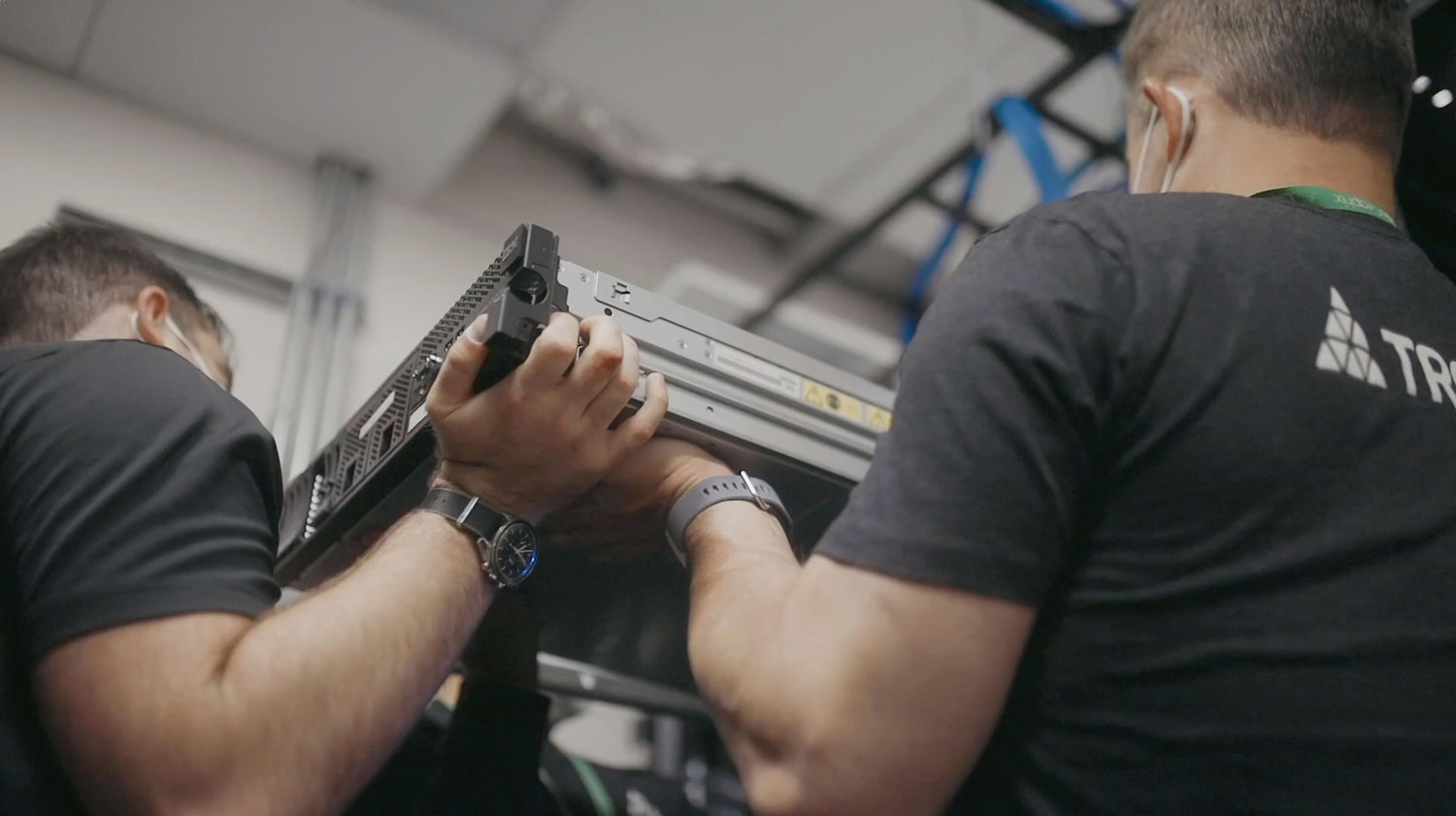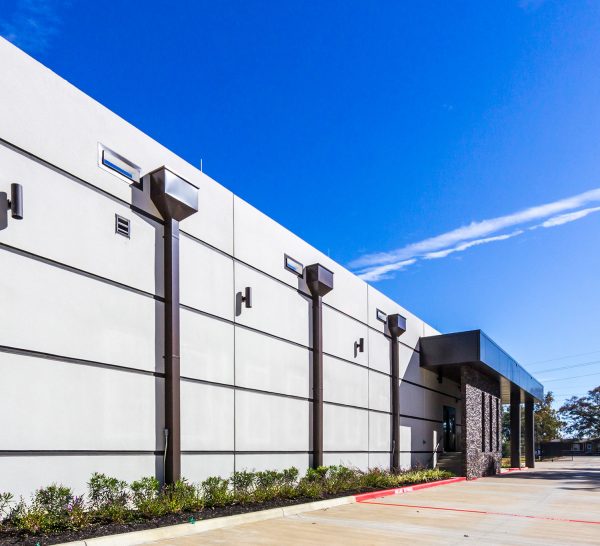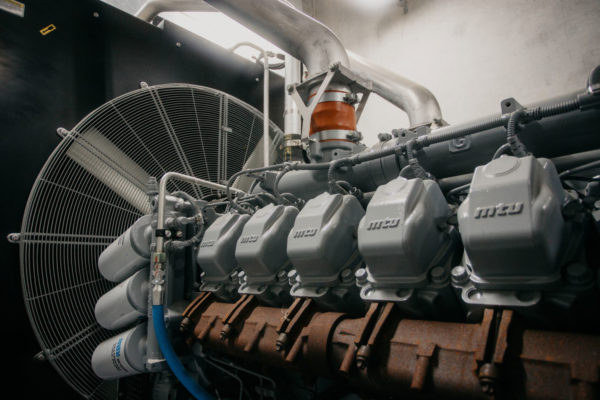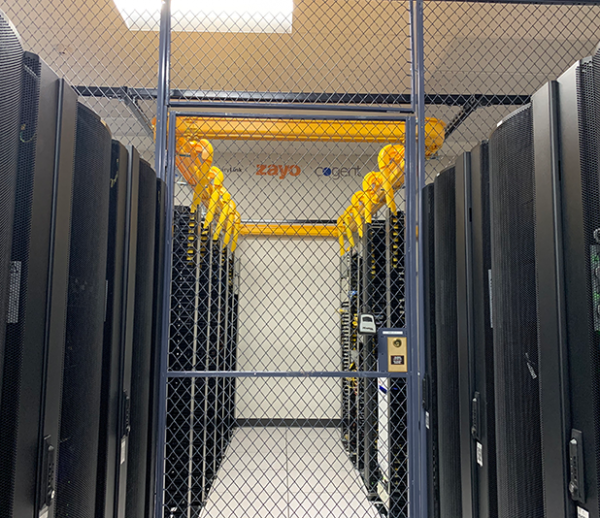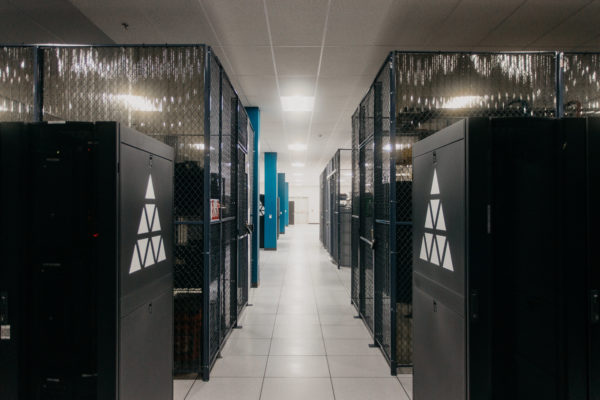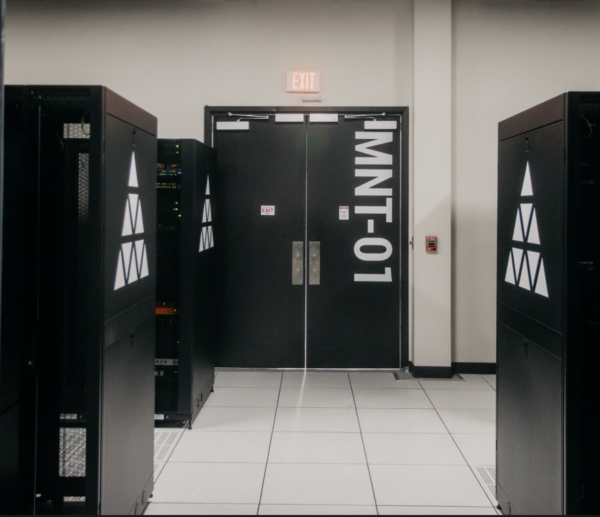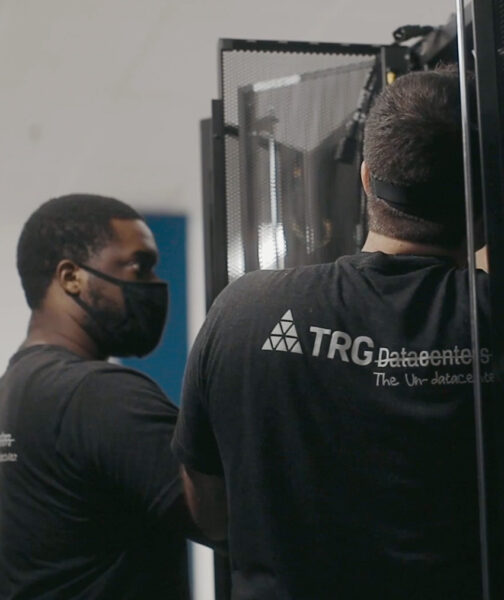Data centers like ours rely on the skill and expertise of a team of professionals, all of whom have dedicated their careers to perfecting their craft. Amongst our team, we have several Data Center Technicians, who are responsible for keeping services running smoothly for all of our customers.
Many of our customers rely on the quick response times and helpful advice of our Data Center Technicians, but we bet only a handful really understand what it is that a Data Center Technician does!
So, we’ve asked a member of our technician team to reveal more about what goes on behind the scenes. If you’re interested in learning more about the role of a Data Center installer, read on.
What is a data center technician?
A Data Center Technician has one primary responsibility: to support the data center.
How does this happen? Data center roles and responsibilities are customer-based, which means solving customer issues as effectively as possible. As TRG Data Center Technician Anthony explains; “when a customer sends us a ticket, we’ll make sure we see it all the way through and that the customer is satisfied”.
As a by-product of this, a technician’s work covers a lot of areas but often includes; working with individual servers and hardware equipment, maintaining infrastructure, and managing backups as and when required.
Alongside these common responsibilities are other jobs that must be completed by Data Center Technicians, such as upgrading security features and ensuring all maintenance tasks have been completed as needed. Often, Data Center Technicians will also liaise with customers, offering advice and help for a range of problems.
Of course, another large part of the job is cabinet management. As Anthony explains further, a core element of a TRG Data Center Technician’s role is “Racking and stacking equipment as part of Colo+… so making sure everything is cabled correctly and powered correctly and that the customer is satisfied with all of it”
Ultimately, a technician is there to ensure the balance is being maintained between best practice as well as the customer’s own requirements and expectations. They also manage other tasks like running cable links and managing connections, to keep all processes running smoothly for the data center’s customers.
Outside of these responsibilities, a final key part of being a Data Center Technician is simply “keeping the facility looking good”. This means keeping up with day-to-day maintenance around the facility, cleaning, sweeping the floors etc. to ensure everything looks consistently well-presented.
Interestingly, data center technicians aren’t usually what we would describe as ‘IT people’. But the role is a good entry point for roles like critical facilities management, IT hardware management and project management within data centers.
We wouldn’t say a technician needs to be an ‘IT person’ to start off with purely because technicians typically deal with more physical aspects of data center management, such as looking after the physical servers, cabling, power systems, cooling systems and generators. An entry point for new IT team members, on the other hand, would typically consist of responsibilities around help desk management and working up through the stack with virtualization and networking.
The best role to suit an individual really depends on their preference towards the physical or virtual layer. Don’t make the mistake that we often see, though, which is pursuing careers in things like cybersecurity by starting with a role as a data center technician.
If, on the other hand, you’re looking to familiarise yourself with the physical systems that are virtual to the running of a data center, then the role of a technician would suit you perfectly.
What skills does a data center technician need?
As with a lot of jobs, there is no single path that needs to be taken before taking on the role as a Data Center Technician. A lot of the time, however, you’ll find technicians will have undergone training to achieve Data Center Technician Certification, or will have studied for a bachelor’s degree in IT or a related field.
That being said, there is also a lot to be learnt on the job and most technicians find their knowledge, skills and understanding will grow as they continue to work in the industry. But, what are the main skills required to even start on the job? We asked our Data Center Technician, Anthony, and he listed the following:
- “We need a basic knowledge of how a data center works”
In TRG’s case, we have designed the systems to have no single point of failure – and redundancy is a large part of that. Practising redundancy requires another level of understanding. As Anthony explains , “let’s say a customer has two power cables. We’ll need to make sure to put them on separate PDUs (power distributing units) in case one PDU breaks down, the customer will always remain powered on,”
On this note, Data Center Technicians are also incredibly knowledgable when it comes to cabling. With our Colo+ service, technicians will need to know how to correctly cable and power all customer equipment.
It’s also important that technicians are clued up on the latest technology, and that they have a real interest in the industry. This means that they will naturally be keeping an eye on the latest developments in their field, and ensuring that their data center leads the way in offering the most advanced technology to its customers.
Data Center Technicians will have a good understanding of a wide range of different operating systems, including all of the most commonly used ones as well as a fair few lesser-known options. They will also know all there is to know about network infrastructure and will be brilliantly knowledgeable about hardware and its deployment.
- “A keen eye for details”
Given their role in supporting the overall running of a data center, a technician needs to be able to spot anything abnormal.
As Anthony explains, “When you’re doing your daily walk-through, you want to make sure you don’t smell (e.g smelling smoke, detecting if a power supply has burned out, if drains need to be cleaned etc) or see anything out of the norm.
You want to be always looking around, up and down as well as straight forward, because sometimes there will be something on the ground or above that you, or somebody else, may have missed”
- “The ability to make quick decisions”
This is especially vital when dealing with customer equipment – it also means knowing when to escalate and delegate specialist issues to the right teams. “If the issue’s something you’re incapable of doing yourself, scale it up to somebody else to assist you”
- “Work well with others”
A Data Center Technician needs to be able to work within a team. Anthony explains the importance of teamwork in completing tasks and projects, particularly for something like moving customer equipment, where working together ensures safety as well as ensuring everything gets completed smoothly and on-time.
- “Provide outstanding work for customers”
This comes down to overall spirit and attitude, as well as work ethic. According to Athony, the best Data Center Technicians not only give 100% effort, but they are also “just genuinely happy to do the work”.
What does the role of a data center technician entail?
As the main line of defense in protecting the sensitive data held by data centers, the role of a Data Center Technician is an enormously skilled and important one.
Technicians don’t, as is often assumed, work on a 9-5 basis. They’re on hand 24 hours a day, seven days a week, to deal with any emergencies as they crop up.
Technicians tend to have jam-packed schedules, and no two days are ever the same for these professionals. They often work in shifts and are expected to cover weekends and holidays as well as midweek days.
For busier times, i.e day shifts where there are a lot of customer tickets expected, there will usually be more hands on deck to support the facility. During quieter nights, however, it’s not uncommon to see one Data Center Technician on shift at a time.
You’ll usually find Data Center Technicians working within the server rooms of Data Centers. Here they’ll be responding to crisis calls, managing daily tasks such as maintenance, and keeping an eye on the security of the center to ensure that all customers are well protected from potential hazards.
What does a data center technician’s day to day look like?
While no two days are exactly the same, there are a number of activities and responsibilities a data center technician is expected to complete on a daily basis. An average start to the day for a Anthony is outlined below:
“We always start by debriefing each other on the previous shift”
Data Center Technicians are on duty 24/7, and working in shifts means maintaining good communication is a priority. As Anthony explains, a typical debrief will cover “if anything went wrong, if we answered any customer tickets, which tickets were solved, which were still in progress and those that haven’t been worked on”.
They’re also expected to recap the status of the facility i.e which areas have been cleaned, which ones still need to be covered etc. This is ultimately just to ensure the new shift knows how their work day is likely to look because, as Anthony goes on to explains, “you don’t want to come in blindsided”
“Check out the shift folder”
Documentation helps with ensuring visibility between technician shifts. Each shift folder will have a record of the activities from the previous shift. This includes any customer questions or tickets as well as activities within the facility such as any packages or deliveries that have been received.
“Walkthroughs”
After a debrief, the technician on shift will carry out their own walkthrough of the facility. As Anthony summarises, a walkthrough is essentially a check of every part of the facility to “make sure everything is running fine”.
What exactly should a technician be looking out for? This is where the eye for details really comes into play. A Data Center Technician’s job is to spot anything out of the norm this includes “any abnormal smells, anything on the ground, anything dirty” that will impact how the data center is presented and how it is run.
“Maintenance cleaning”
Anthony explains “before we get deep into our shift, we’ll do a maintenance clean”. This means cleaning up the bathrooms, sweeping the floors and ultimately just ensuring the facility is still looking good before starting on the main project currently being worked on.
As Anthony says “sometimes the nights can get really crazy” which means the everyday maintenance side of things can often be missed out – this is why it’s good to get it done earlier in the shift.
How do you become a Data Center Technician?
Our data center technicians come to us via a range of quite different paths. If you’re looking to land a job as a technician, there are several ways that you can do so.
Do your homework
Before you begin, you’ll want to spend time learning the basics. Make sure you know the ins and outs of what the role entails and what you’ll be doing on a day to day basis. Then, you can begin talking to those in the industry to learn more about the entry points that might be available to you.
In your first few weeks and months as a data center technician, you’ll get first hand experience with power, safety and mechanical cooling systems, as well as generators and uninterruptible power supplies. You’ll also be learning about things like rack hardware, interconnectivity and connections, as well as getting to know the difference between fiber types.
New technicians typically learn how to fiber splice and how to run cables early on, so you’ll soon be a dab hand when it comes to recognising the parts that are needed to manage tasks like these efficiently.
Hot air and cold air containment is another key part of a technician’s role, so you can expect to learn all about this as a new technician.
Of course, the more you know before you begin the better, so take the time to read up on some of the great online resources that are available. Here are a few we recommend.
Recommended resources
Infrastructure Masons (iMasons) is a global, nonprofit, professional association of individuals which aims to build a greater digital future for all. Make use of the resources provided via the iMasons platform; it’s invaluable to those looking to connect, grow and give back within the industry.
Data center services companies, such as Salute Mission Critical, also provide incredibly informative insights into the data center industry. The resources available here have a focus on innovation, sustainability, and strategic growth.
Landing your first data technician job
When it comes to finding your way to a technician role, there are many different options out there. Speak to our team about current vacancies, or looking at businesses like QTS Data Centers to see what’s available right now. Multinational companies like Equinix are also often on the lookout for new technicians, so it could be worth talking to them too.
There are even organizations designed especially for veterans looking to get into the industry. Overwatch Mission Critical is a service-disabled Veteran-owned small business, which offers construction professional services and talent acquisition for the mission-critical infrastructure industry. The company specialises in constructing and managing data centers, with the help of high-end engineers to seasoned professionals.
Career paths for data center technicians
Time spent as a data center technician can be hugely important in pursuing a whole range of different career paths. One of the roles that our technicians often progress to is that of a project manager.
Project managers are hugely important within the industry, but of course the most capable ones require in-depth knowledge on the running of a data center. And that’s why we often see technicians move into this role, because it’s far easier to teach an already well informed data center technician about project management than it is to train a brand new project manager with no data center experience.
Working within a data center and getting to know, first hand, how it all works provides a fantastic base of knowledge for project managers – and means they’re ready to hit the ground running from day one.
Four things you might not know about Data Center Technicians
The role of a Data Center Technician remains something of a mystery to most people, and there are many aspects to these professionals’ careers that may well surprise you. Here are four things you may not know about Data Center Technicians and what they do – as told by a real technician.
Data center technicians care a lot about the work
This shouldn’t be surprising but Data Center Technicians really are passionate about what they do. As Anthony explains, “we are passionate about the work we do, particularly when it comes to the maintenance of the facility, customer tickets and working with each other”.
It’s ultimately this mindset that ensures TRG’s facility continues to work to a top-tier level.
A data center technician is a jack of all trades
“Whether helping someone on another shift to complete a task that needs to be finished or furthering your own education about the facility and how it works”, technicians are always looking for ways to contribute and improve.
The best Data Center Technicians will be curious and want to learn about the different elements of operating a data center so they can grow their skillset and help out as much as possible, rather than be limited to one field of expertise.
Data center technicians are great team players
Though the role sometimes involves working alone, technicians still need to be great communicators. As Anthony explains, this is to “make sure we’re all on the same accord…when we’re working on a customer ticket or there’s anything going on in the facility, we’ll communicate with each other” Thorough communication is of the utmost importance and involves, as Anthony says, “making sure we don’t leave out details on shifts so we’re as prepared as possible”
Data Center technicians are focussed on providing the best service possible for customers
It may be thought of as more of a ‘behind the scenes’ role, but being a technician is a customer-centric job. “Ladies and gentlemen serving ladies and gentlemen” is the motto to work by, according to Anthony. This means everyone on the team should be “polite, energetic and…are always trying to be the best versions of ourselves” in order to provide the best service possible.
Q&A with Our Data Center Technicians
We interviewed five of our newer data center technicians to see how they felt about making the move into the industry, and what advice they’d give to others looking to do the same. Here’s what they told us.
What made you want to become a data center technician?
All of our new data center technicians were drawn to their roles thanks to the extensive opportunities that such roles provide, and the fact that little to no experience is necessary to start work as a data center technician.
Our new technicians all said that they had been on the lookout for a career opportunity within the IT field, and this was a role that allowed them to make that move.
The fact that technician roles allow for plenty of learning on the job also attracted some of our newer team members. One technician joined us having previously worked in retail, so this was a significant change for him – but it was one that has already provided amazing opportunities for growth in IT.
What were your biggest challenges in your first six months of the job?
Our newer technicians all said that they found learning on the job challenging, yet rewarding. The top challenges they faced were learning and retaining the huge amount of information that new technicians need to get to grips with, and having to do that on the fly in what can sometimes be a very fast-paced working environment.
Overcoming starting a new role without any experience was also mentioned as one of the top challenges for new technicians.
What did you learn the most about?
Within weeks of starting work here at TRG, our new technicians were learning about everything from generators and how airflow works, to new troubleshooting ideas and how their use might affect the facility.
One of our new technicians spent time going through manuals for CRAC units to really gain a deeper understanding of how they work, while others focused on Colo+ work to gain the understanding required to be able to implement our standards and make them their own.
What did you enjoy the most?
When asked about the most enjoyable parts of their new jobs, our technicians told us that they loved having ownership over certain tasks and being able to plan out their working days.
One of our technicians said he had particularly enjoyed working on Colo+ moves, and successfully managing these significant moves as quickly as possible for our customers.
Another technician highlighted these moves as his top aspect of the job, saying he enjoyed visiting different data centers and learning how to help customers really maximise their capabilities, while also getting to see the real world of the data center industry.
What was your least favorite aspect of the role?
We couldn’t resist asking our new technicians about their least favourite responsibilities at work! Time and time again, cleaning was mentioned as the worst part of being a new data center technician – but some jobs just have to be done!
We also talked about the curveballs that can be thrown during the working day, sometimes without any warning. Challenges like these really keep our new technicians on their toes, but they’re always great learning opportunities.
What advice would you give to others looking to become a data center technician?
Those aspiring to make their way into the IT industry as a data center technician need to be curious, inquisitive and unafraid to ask questions. New technicians have so much to learn, and they need to be open to doing so and acting on feedback when needed.
Our new technicians told us that those hoping to follow in their footsteps really need a passion for technology, and also a drive for helping others. Many of the technician’s day to day tasks revolve around assisting customers, so good customer service skills are a must.
Some new technicians come to the role with more experience than others, but there are plenty of things you’ll only learn from hands-on work within a data center, so don’t come in expecting to know it all from day one. And don’t be afraid to get stuck in even if you’re not feeling 100% confident. Our new technicians told us that with so much to learn it’s difficult to really know everything inside and out at such an early stage, your ability and willingness to learn is far more important.
Get advice from a data center technician
The role of a Data Center Technician is a rich and varied one, where every day is different – and new challenges are always around the corner. If you’re interested in learning more about our technicians, don’t hesitate to get in touch with our team.
We’d be happy to talk you through the skills our technicians possess, so you can rest assured that your data is always in safe hands with our team.
Looking for colocation?
For an unparalleled colocation experience, trust our expert team with three generations of experience
